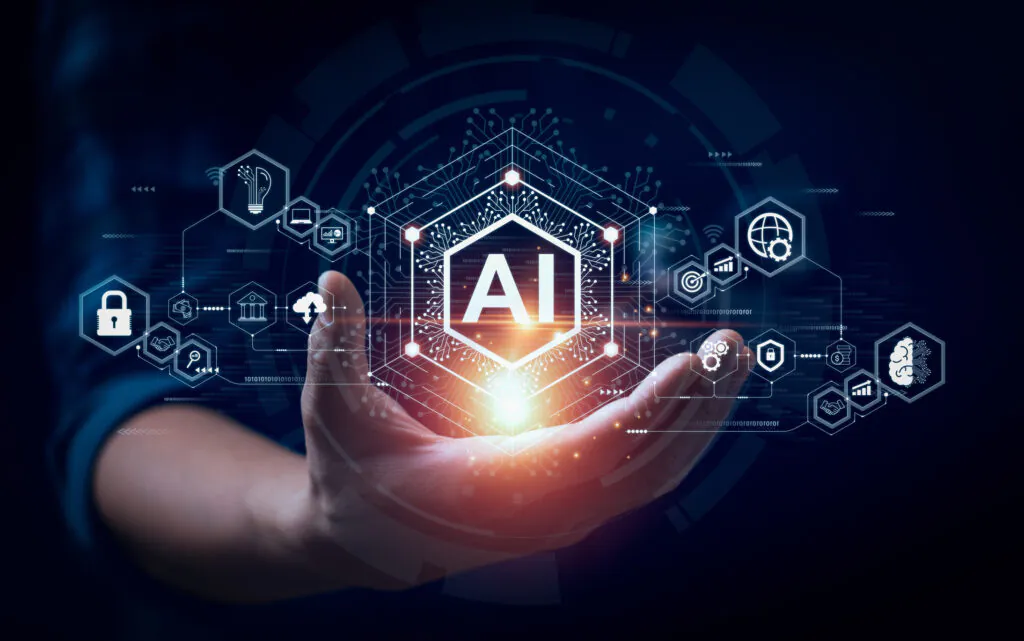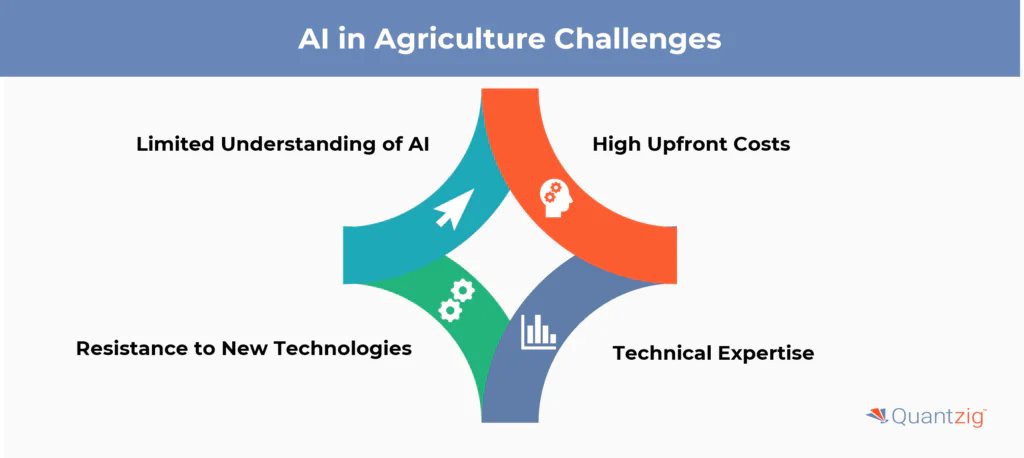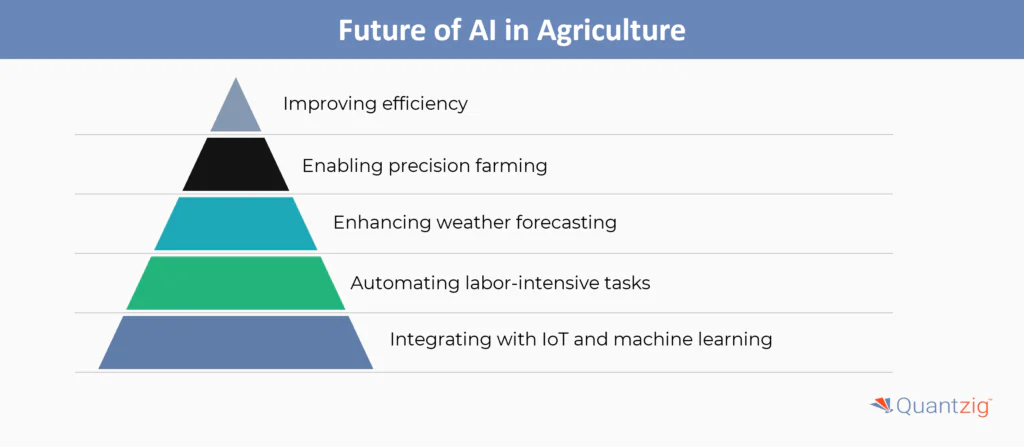Table of Contents
Table of Contents
- Introduction
- What is AI in Agriculture?
- Importance of Using AI in Agriculture
- Key Benefits of AI in Agriculture
- Applications of AI in Agriculture
- Challenges of AI in Agriculture
- Optimizing AI for Agriculture and Agricultural Processes
- Future of AI in Agriculture
- Quantzig’s AI in Agriculture Solution
- Conclusion
Author: Associate Vice President, Analytics and Data Strategy, Quantzig.
Introduction to AI in Agriculture
In the vast expanses of agriculture, where precision and efficiency are paramount, Artificial Intelligence (AI) emerges as a disruptive force, revolutionizing traditional farming practices. Welcome to the realm of intelligent agriculture, where Quantzig, armed with cutting-edge AI solutions, orchestrates a visionary transformation in the sector. This article explores the profound impact of AI on agriculture, delving into innovative applications that enhance farm operations, improve yields, and pave the way for a sustainable and technologically advanced future.
Book a demo to experience the meaningful insights we derive from data through our analytical tools and platform capabilities. Schedule a demo today!
Request a Free DemoWhat is AI in Agriculture?
AI in agriculture refers to the application of artificial intelligence technologies to optimize various agricultural processes and enhance productivity. AI-powered systems can analyze data from sensors, drones, and satellites to provide real-time insights for precision farming, automate labor-intensive tasks, and optimize supply chain logistics. By integrating AI, farmers can improve crop yields, reduce resource consumption, and promote sustainable practices to meet the growing global demand for food.
What is the Importance of Using AI in Agriculture?
Using artificial intelligence (AI) in the agricultural sector is crucial due to its ability to revolutionize crop production and optimize yields through innovative practices and technological advancements. AI in agriculture facilitates precision agriculture by employing predictive analytics and data analytics to enhance soil fertility and maximize efficient land use. This is particularly beneficial for large-scale farming, where AI-powered products and intelligent automation enable real-time monitoring and timely decision-making. By leveraging cloud services, AI helps meet market demand and achieve significant cost savings. As the AI and agriculture market grows, these advancements lead to sustainable farming practices and increased productivity.
What are the Key Benefits of AI in Agriculture?
| Benefit | Explanation |
|---|---|
| Increased Crop Yields | AI-powered applications track data on soil health, weather patterns, and plant growth, enabling farmers to make informed decisions about irrigation and fertilizer use, leading to higher yields. |
| Reduced Pesticide Use | AI detects pests and diseases early, allowing targeted pesticide use, reducing overall pesticide consumption. |
| Improved Soil Health | AI tracks soil moisture levels, pH levels, and nutrient levels, guiding decisions on irrigation and fertilization, leading to healthier soil. |
| Reduced Water Use | AI helps manage water resources effectively by predicting weather patterns and plant growth, reducing water waste. |
| Increased Efficiency | AI automates tasks like crop monitoring and yield analysis, optimizing operations and reducing labor costs. |
| Precision Farming | AI uses data from sensors and drones to optimize crop management, reducing waste and improving resource utilization. |
| Cost Savings | AI helps farmers optimize resources, reducing labor costs and insurance expenses, while ensuring maximum yields. |
| Disease Prevention | AI detects early signs of disease in crops, enabling targeted interventions to prevent spread and reduce losses. |
| Livestock Monitoring | AI helps monitor animal health, detecting early signs of disease and optimizing feeding and breeding practices. |
| Food Quality Control | AI ensures high-quality food by analyzing products for spoilage and damage, minimizing waste and ensuring food safety. |
These benefits collectively contribute to more efficient, sustainable, and profitable agricultural practices, ultimately enhancing global food security and reducing environmental impact.
What are the Applications of AI in Agriculture?

Revolutionizing Farm Insights with AI
AI stands as the game-changer in the modernization of agriculture, propelling the industry into an era of data-driven decision-making. Quantzig’s advanced AI solutions decipher intricate datasets, unraveling patterns, optimizing farm processes, and offering unprecedented insights into the agriculture sector.
Precision Farming
AI-driven precision farming techniques leverage data analytics to enhance crop management. From predictive analytics forecasting optimal planting times to monitoring soil health, AI empowers farmers to make informed decisions, maximizing yields and minimizing resource use.
Crop Monitoring and Disease Detection
AI algorithms analyze images and sensor data to monitor crop health and detect diseases at early stages. This proactive approach allows farmers to take timely measures, preventing the spread of diseases and minimizing crop losses.
Autonomous Farming Equipment
AI in agriculture extends to autonomous farming equipment, where smart machines powered by AI algorithms perform tasks such as planting, harvesting, and irrigation. This not only reduces the labor burden but also optimizes efficiency.
Seamless Integration into Agricultural Operations
Incorporating AI into agriculture isn’t merely a technological upgrade; it’s a strategic investment in optimizing farm processes and ensuring sustainable practices. Quantzig’s AI solutions seamlessly integrate into existing agricultural workflows, enhancing operational efficiency and productivity.
AI for Precision Irrigation
AI optimizes irrigation processes by analyzing soil moisture levels and weather conditions. This precision ensures that crops receive the right amount of water, reducing water wastage and promoting sustainable farming practices.
Crop Recommendation Systems
AI algorithms analyze historical data and current conditions to recommend suitable crops for specific regions. This personalized approach aligns with individual farm needs, optimizing yield and resource utilization.
Livestock Monitoring with AI
AI-powered systems monitor livestock health, feeding patterns, and overall well-being. This data-driven approach enables farmers to detect health issues early, improving the overall welfare of the animals.
Supply Chain Optimization
AI facilitates supply chain optimization by predicting harvest times, monitoring inventory levels, and streamlining distribution processes. This ensures a smooth flow from farm to market, minimizing wastage and maximizing profitability.
Experience the advantages firsthand by testing a customized complimentary pilot designed to address your specific requirements. Pilot studies are non-committal in nature.
Request a Free PilotChallenges of AI in Agriculture

- Limited Understanding of AI: Many farmers and agribusinesses lack a comprehensive understanding of AI tools and their applications, leading to slow adoption.
- High Upfront Costs: Implementing AI systems can be expensive, which may be a barrier for small-scale farmers and those in developing countries.
- Resistance to New Technologies: Unfamiliarity with AI and reluctance to adopt new processes can hinder its integration into traditional farming practices.
- Technical Expertise: Farmers may need additional training and support to effectively operate and maintain AI systems, which can be a challenge in rural areas with limited resources.
Optimizing AI for Agriculture and Agricultural Processes

AI is revolutionizing agriculture by optimizing various processes and enhancing sustainability. Here are some key ways AI is being used to optimize agriculture:
Precision Farming
AI facilitates precision agriculture by analyzing data from sensors, satellites, and drones to optimize resource allocation. This includes:
- Precise application of water, fertilizers, and pesticides based on real-time conditions and crop needs
- Predictive analytics to optimize planting patterns by analyzing historical data, weather forecasts, and market trends
Automation of Labor-Intensive Tasks
AI-powered machines automate labor-intensive tasks like harvesting, sorting, and grading produce. This:
- Reduces reliance on manual labor and improves efficiency
- Ensures consistent quality and reduces food waste
Crop Health Monitoring
AI algorithms process field images to identify pests, diseases, and nutrient deficiencies. Machine learning enables:
- Early detection of issues to enable targeted interventions and prevent crop losses
- Reduced use of chemicals by applying them only where necessary
Supply Chain Optimization
AI enhances logistics, storage, and distribution to reduce food waste and ensure produce reaches consumers in optimal condition:
- Predictive supply chain management based on demand patterns and market trends
- Quality control and sorting using computer vision and machine learning
- Cold chain management by monitoring temperature and humidity levels
Sustainable Practices
AI promotes sustainable farming by:
- Reducing greenhouse gas emissions through precision agriculture techniques
- Monitoring and managing the impact on ecosystems to conserve biodiversity
- Optimizing resource use like water, energy, fertilizers and pesticides
The future of AI in agriculture is promising, with significant potential to enhance yields, improve efficiency, and promote sustainability. However, challenges like high costs and resistance to new technologies must be addressed to enable widespread adoption. With strategic implementation and support, AI can revolutionize modern agriculture.
What is the Future of AI in Agriculture?

The future of AI in agriculture is promising, with significant potential to enhance crop yields, improve farming efficiency, and promote sustainable practices. AI is poised to revolutionize modern agriculture by:
- Improving efficiency: AI can optimize crop yields by analyzing data from sensors and drones, enabling real-time monitoring and adjustments to improve crop health and reduce waste.
- Enabling precision farming: AI-powered precision farming can reduce resource consumption by optimizing irrigation, fertilization, and pest control, leading to better crop quality and reduced environmental impact.
- Enhancing weather forecasting: AI-based weather forecasting systems can help farmers predict and prepare for weather conditions, reducing crop damage and improving yields.
- Automating labor-intensive tasks: AI can automate tasks such as crop monitoring, soil analysis, and pest detection, freeing up labor for more strategic activities.
- Integrating with IoT and machine learning: AI can integrate with IoT sensors and machine learning algorithms to provide farmers with real-time insights and predictive analytics, enhancing decision-making and productivity.
However, the adoption of AI in agriculture faces challenges such as limited understanding of AI, high upfront costs, resistance to new technologies, and the need for technical expertise. To fully realize the potential of AI in agriculture, governments, non-profit organizations, and the private sector must work together to provide farmers with the necessary resources, training, and support.
Elevating Agriculture Intelligence: A Quantzig Perspective
In the symphony of data and artificial intelligence, Quantzig leads a visionary transformation in the agriculture sector. For farmers, agribusinesses, and industry professionals, embracing AI isn’t just a technological shift; it signifies a strategic leap into a future where agriculture intelligence is comprehended, envisioned, and strategized upon. Welcome to the era of intelligent agriculture, where AI catalyzes actions, shapes sustainable practices, and fosters unparalleled growth. Step into the future with Quantzig, where AI illuminates the path to agricultural excellence.
Conclusion
In conclusion, AI’s impact on agriculture is transformative, ushering in an era of efficiency, sustainability, and data-driven decision-making. As Quantzig spearheads this revolution, the agriculture industry can look forward to a future where innovation and intelligence converge to meet the growing demands of a dynamic and evolving sector.
Get started with your complimentary trial today and delve into our platform without any obligations. Explore our wide range of customized, consumption driven analytical solutions services built across the analytical maturity levels.
Start your Free Trial


